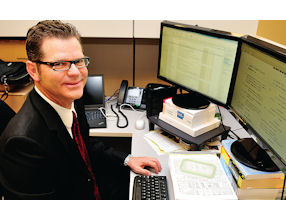When Christie Parker Hale LLP moved to Glendale from Pasadena two years ago, the attorneys knew they could shrink their footprint by downsizing the library. In Pasadena, the firm had an extensive collection that included traditional casebooks and legal texts. Because the 45-lawyer firm concentrates on patent and trademark law, it also had technical manuals, scientific monographs and even engineering diagrams. But the firm no longer needed all this hard-copy knowledge. “Over the years, we saw less and less use for it, particularly by younger lawyers who do their research online,” said Gregory Lampert, 49, managing partner. “So when we moved here we significantly downsized the library. And the much smaller library we have now doesn’t get used much either.” But that change is only one aspect of the changes the digital revolution has wrought at the firm. The firm also reduced its conference space because most client interaction is now via email, rather than face-to-face meetings in conference rooms or lawyer offices. Its clients include Samsung Electronics, California Institute of Technology, USC, UCLA and Schlumberger Ltd. And instead of a physical library and librarians, the firm now maintains its own computer network, employing five full-time IT professionals to manage it. However, the cost of the technical staff is more than offset by new technology that allows lawyers to write their own briefs and file documents electronically. The firm maintains one administrative assistant for every two attorneys, compared to 20 years ago when the ratio was one-to-one. The drive to digital isn’t completely internal. The U.S. Patent Office encourages the submission of digital applications by charging more for paper applications. Moreover, the complex process of searching all previous patents to make sure a new application is a true innovation has been simplified. In the old days, federal employees called examiners helped attorneys wade through files of similar patents. Now the Patent Office has a searchable online database, and governments in Europe and Japan have similar programs. “The days of a patentablity search and talking to examiners are gone,” Lampert said. John Grimley, a consultant in downtown Los Angeles who helps law firms market their services, said for most small and mid-sized firms like Christie Parker Hale, a challenge is whether their attorneys can adapt. “The danger isn’t the technology, it’s the unwillingness or inability to take the time necessary to learn about the digital economy,” he said. “Lawyers are their own worst enemies because they tend to be slow adapters. The digital economy is coming so quickly, they need to learn quickly.” However, Lampert said the adaptability issue has diminished over time, as the older generation has retired or learned the technology. Revenue neutral Financially, digitalization hasn’t affected the firm’s revenue because the number of billable hours per workday hasn’t changed. “So you just do more work in that amount of time,” Lampert said. About 30 percent of Christie Parker Hale’s revenue comes from trademark law. Just a few blocks away from the firm’s office are the headquarters of LegalZoom.com Inc., the online legal juggernaut that can perform a basic trademark application for as little as $169. Lampert said LegalZoom works fine for a simple filing, but if another company contests the new trademark or the Trademark Office rejects the application, it’s time for an expert attorney. “People who have taken the initial step of filing with LegalZoom and have an issue come to us,” he said. The biggest challenge of digitalization for the firm may be the rising expectations of clients. In a business that makes its money from billable hours, the digital economy brings plenty of interruptions and distractions. “They send you an email and 30 minutes later, if you haven’t responded, they call and say, ‘Did you get my email?’ The expectation for completion of tasks is something you have to stay on top of,” Lampert said. In the future, Grimley believes the legal industry could evolve to the point where law firms are virtual, with lawyers working at home and dealing with clients, courts and others via email, Skype and phone. The advantage would be the vast potential geographic market for such a firm. But Lambert sees drawbacks at the prospect of Christie Parker Hale becoming a virtual firm. The profession would lose its sense of collegiality, as when an attorney walks down the hall to consult with a co-worker about a particular problem. “I can see how if the technology improves, it could be possible to do without the brick-and-mortar office where people come to work every day,” he said. “But a lot will be lost if we ever get to that point.”
